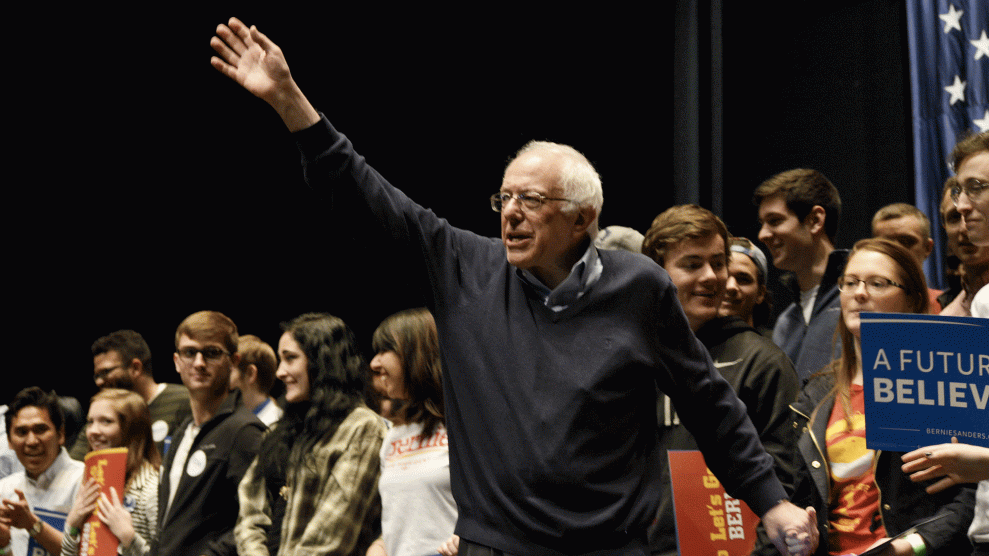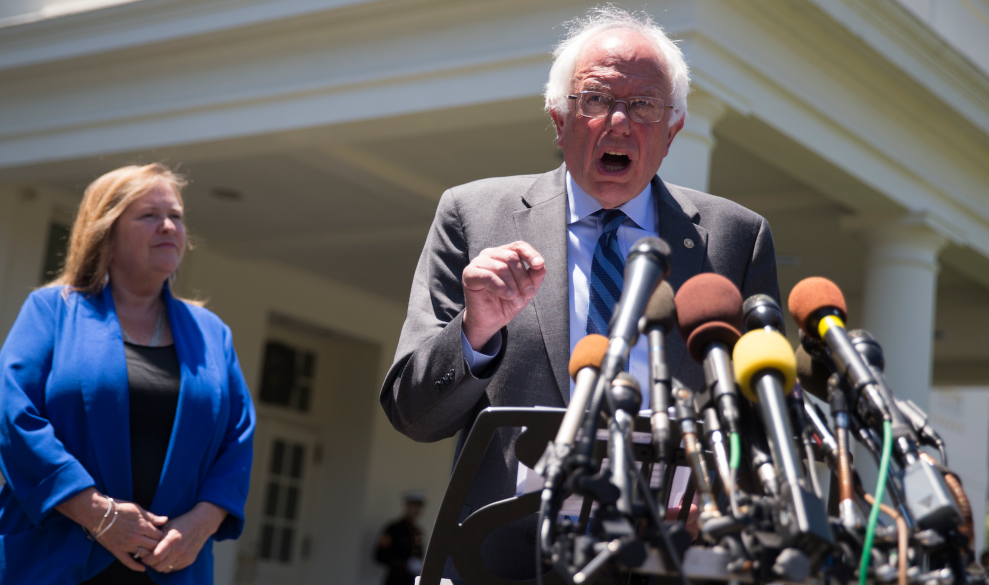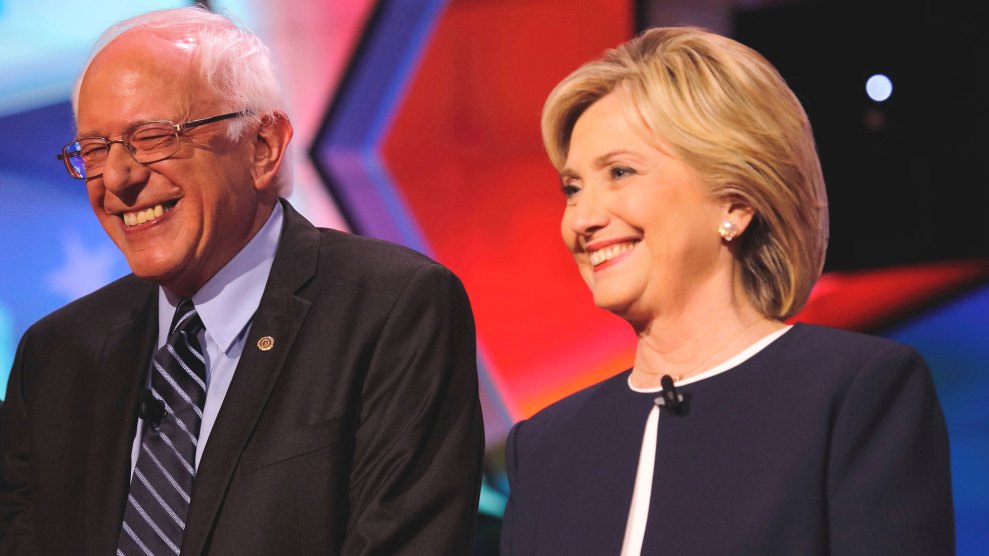
<a href="https://www.flickr.com/photos/ajhanson/24315754630/in/photolist-D3GAGN-D3GAJG-CxqNjz-D3GAVd-D3GAE3-Dsvjh7-CWjsHa-D3GBEE-D3GBhA-CxqNpK-D3GBDs-Dkf6L3-CxiXTu-CWjsvB-CWjsq6-D3GAQo-Dkf69S-Dsvjj1-uKPWnL-vGQjz2-ySXy4S-ydF3cx-ySXm3h-vVL7to-vVL6u7-vVL7rY-ySX8nC-yT3NpX-zayf6i-ydwjSA-zbo9aa-D9vYE1-CD84u5-ySXozb-ySXddu-vuWrL5-DnxRrT-DnxR6x-CxqNJn-DsvjQS-CxiXVd-Dkf63Q-D3GBrd-DnxRbT-CWjtfx-DsvjYY-DuPfeP-DsvjLU-CWjsQe-CWjssa">Alex Hanson</a>/Flickr
On the eve of the presidential primary in Washington, DC—the final vote of the campaign—Bernie Sanders stood before a massive crowd of placard-waving supporters and reflected on a run that defied all expectations. “What the punditry thought was that this campaign would not go very far,” he said. “Well, here we are in mid-June and we are still standing.”
Sanders has pledged to take his nomination fight all the way to the floor of the Democratic National Convention, pushing platform and rules changes that would empower progressives. But if he wants to create a lasting legacy in the months and years to come, he must figure out how to parlay the momentum of his campaign into an enduring progressive movement.
Others have tried this before. After winning 11 states in the 1988 Democratic presidential primary, Jesse Jackson channeled his campaign’s progressive energy into the Rainbow Push Coalition, an activist group dedicated to racial justice. Former Vermont Gov. Howard Dean lost an insurgent presidential bid in 2004 but used his formidable email list to create Democracy for America, a group dedicated to electing progressives. But such efforts have fallen far short of political revolution.
So what should Sanders do next? Mother Jones asked four leaders from the country’s top progressive political groups: Neil Sroka of Democracy for America, Ben Wikler of MoveOn.org, Adam Green of the Progressive Change Campaign Committee, and Dan Cantor of the Working Families Party. Here’s how they mapped the road ahead for Sanders:
Neil Sroka: After you are unsuccessful, one of the most important things is to prove that you can be successful. After the 2004 election was over, the very next thing Democracy for America did was launch a campaign to make Howard Dean the chair of the Democratic National Committee. That was a quick win, a show of power within the Democratic Party, and it fundamentally changed things in some really important ways. For Sanders, there are some obvious wins that can be made at the Democratic National Convention to show some real power. In terms of rules changes, he should be calling for the elimination of closed primaries going forward and also the elimination of superdelegates, or curtailing them so they only vote if the presumptive nominee is incapacitated or indicted.
Mother Jones: And that would benefit progressives?
Sroka: Yes. At the end of the day, this is about people having a greater say in these nominating contests, instead of them being decided by party insiders.
Ben Wikler: The criteria for organizers is: How can you fight such that your movement will be stronger whether you win or lose at the end? And where you win enough times that you are demonstrably growing in power? I think changing the Democratic Party platform [at the convention] is a great place to start. It should include expanding Social Security, a $15 minimum wage, and breaking up too-big-to-fail banks on Wall Street—among other Sanders priorities.
MJ: But people say that nobody pays attention to party platforms.
Sroka: Typically the platform is ignored, but if millions of people make the platform fight important, it is hard to ignore. And it would be a crucial document for making the nominee accountable after they are elected. A decision to make it valuable will make it valuable.
MJ: How much weight should Sanders put on getting Clinton to pick a really progressive vice president?
Dan Cantor: Everything is negotiable. I don’t know that I would make that a fault line.
MJ: But this person could be the next president.
Cantor: Maybe he really is strong enough to fight for somebody who is unexpectedly terrific. But I wouldn’t put all of my eggs in the V.P. basket. I think it’s also about elevating issues that people will be excited to work on in their cities and states going into the future.
MJ: Should Sanders be worried that asking for too much will divide the Democratic Party?
Adam Green: There’s really two ways to look at Democratic Party unity. One approach would be functionally telling Sanders supporters to get in line to defeat Donald Trump. Saying, “Nothing else matters.” The other approach is to genuinely unite millions of Clinton and Sanders supporters around big, bold, progressive ideas that both candidates campaigned on in the primary. Ideas like debt-free college, expanded Social Security benefits, breaking up too-big-to-fail banks. So it’s actually essential for Hillary Clinton as she aims to bring Sanders supporters into the fold, but also as she fends off Donald Trump’s fake economic populism on issues like Social Security and trade, for her to go big on these progressive issues.
MJ: Assuming it’s enough to get Sanders supporters to vote for her in the fall.
Wikler: Bernie or bust actually reduces the leverage for Bernie to claim victory. It’s not only important for [Sanders supporters] to show up [to vote for Clinton], it’s important for them to show up as a movement, so it is clear where these victories are coming from in November. That they are coming not from persuaded Republican swing voters but rather from a fired-up progressive movement that is carrying forward regardless of what happens in the primary.
Sroka: There’s a view that all Clinton needs to do is reach out to Republicans who hate Donald Trump, and they can get their winning majority from that. Well, I have real doubts about that, but if that is your path to victory, then it is a recipe for disaster when you are in the White House because the Republicans in Congress have proven to be incredibly intransigent to even the middling progressive agenda that President Obama has put forward…Clinton has won the Democratic nomination by making serious promises to the left. Sanders’ job is to push to make sure that those promises are kept, and if they are not, raising holy hell that they haven’t been.
MJ: How could Sanders do that?
Wikler: There is a question as to whether these rallies are going to stop in the fall. I think they should continue. They are a tremendous display of energy but also a source of energy, because people come out of them ready to fight.
When Sanders was challenged about how he would pass his visionary ideas after he became president, he talked about if lawmakers look out the window and they see a million people marching, it changes their calculus. Well, here’s an opportunity to continue working to organize these million people even if he is not the one in office.
MJ: So pick a legislative fight, do a barnstorming tour, and get people in the streets. That’s the model?
Wikler: Yeah, exactly. One after another.
MJ: That idea kind of reminds me of the approach of Jesse Jackson, another guy who ran an insurgent presidential campaign. He jets into different places and lends his star power to things. Sometimes it has an impact, sometimes it doesn’t.
Wikler: Yeah, it’s a lot about choosing your battles. Elizabeth Warren is, I think, a great demonstration of the kind of movement-oriented model-wielding power from within the Senate. Over and over, she’s rallied tons of people to battles that they don’t normally get involved in. I think Sanders is going to have the world’s biggest stage to be able to do that.
Sroka: One of the most exciting things about Bernie Sanders right now is imagining him in the Democratically controlled Senate as chairman of the Budget Committee, with a grassroots army of 8 million plus people behind him. That’s something that we’ve never seen before.
MJ: Done right, that could really change politics.
Wikler: We’ve just gone through this period of years where the players in the game were at least written about as being a Democratic administration, establishment Republicans, and then the rabble-rousing radicals of the tea party. And it was like a three-way negotiation between them. But we are going to enter an era where there’s a physical, powerful, vibrant progressive movement that will, I think, be able to exercise power in the same way as the right-wing and the right does.
MJ: So basically a tea party for the left, but maybe one that’s not as…
Wikler: Not as monolithic.
MJ: But the tea party owes its existence to people like the Koch brothers. These things don’t just pop out of thin air.
Wikler: The most important thing will be building a bench of powerhouse progressives in elected office and in the next administration. Sanders has an enormous spotlight that he can shine on champions that are following the Sanders path of really building from the left. What he does next will really determine whether he is blazing a trail that others can follow into office, or whether he is an exception to the rule.
Green: We’ve already seen early evidence of Bernie Sanders leveraging his millions of grassroots supporters to help congressional and other down-ballot progressive candidates. Lucy Flores is on the ballot next week in Nevada, and Sanders’ email for three candidates, of which one was her, raised her over $300,000. Which was a game changer. It led her to have the resources to compete. She has bought TV ads and direct mail about these progressive ideas like expanding Social Security benefits and debt-free college. It really is an extension of the big populist ideas that Bernie has been talking about all along, but played out on a local campaign trail.
Cantor: The bigger focus is the Senate, though. I am sure the Sanders people are already mapping this out. It is very important for the progressive movement that the Democrats take the Senate, partly so Bernie has a bigger megaphone. If Democrats are again in the majority, he will be a very important chair from one of the most important committees, and from that perch he can put forth concrete proposals. Republicans can try to obstruct, but the rest of us who mobilize in the field can overcome it. My view is that if we do this well, Republican senators will recognize that standing against free public higher education is something you do at your own peril because you are up for election in 2018.
MJ: But would a focus on winning the Senate risk diluting Sanders’ brand? What would happen if he backed a Blue Dog Democrat?
Green: The way to keep the energy high among his lists is to continue to be perceived as an outside force that is pushing the Democratic Party to be even better on economic populism issues. And when he puts his seal of approval on a candidate, that means that they are a couple of steps ahead of the Democratic Party in terms of the ideas they are campaigning on.
MJ: Do you think he should start his own organization?
Sroka: We know that nothing inspires people like a presidential campaign. That would be a strong organization, one we would want to work with. He could also have a smaller organization and work closely with others who are already doing this work.
Wikler: Sanders and the group of organizers around him are probably thinking this through at this exact moment. An organization is great if you have a clear vision to be able to make it powerful. If you don’t, an organization can kind of sap energy that could go elsewhere. Closing up shop would be the biggest mistake. Having an email list that falls off the back of a truck and gets scooped up by a million and one political vultures would be the second-biggest mistake.
MJ: Is there a risk that Sanders could start to be perceived like Howard Dean—a onetime insurgent who has been subsumed into the political establishment?
Sroka: If Sanders becomes a part of the political establishment, I would say we did a good job. Because the only way that will happen is if the establishment changes in major ways.
MJ: How optimistic are you about that actually happening?
Cantor: It is very important that people feel incredibly proud and happy about what they have accomplished. Because they need to do it again. And they need to do it again after that. It is not as if the right ever gives up. And this is what is exciting about Berne Sanders. Because of the youthful age of his base, it means that for 40 years you will have a generation whose idea of politics was formed by the Bernie Sanders campaign.
MJ: But they said that about George McGovern in 1972, and then in the 1980s we got Ronald Reagan.
Cantor: McGovern totally changed the culture: the role of women in society, the role of blacks in society, the role of gay people—all of this comes out of the template of the civil rights movement, the New Left. We won the culture war, but we didn’t win the economic and political war. Now we have a chance to do that.
















